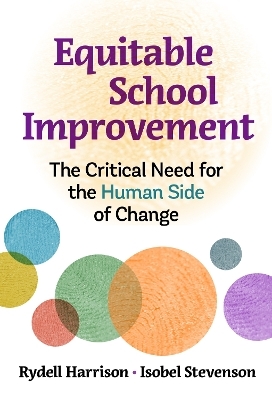
Equitable School Improvement
Teachers' College Press (Verlag)
978-0-8077-6958-4 (ISBN)
Promoting equity and improvement science have seen increased attention over the last several years as educators seek to expand the experiences, opportunities, and outcomes for marginalized students. This book shows school and district leaders how to create the conditions needed to use improvement science—with its robust collection of tools, resources, and processes—to achieve equity. Readers will find information about equity, continuous improvement, and the psychology of change that can be used to productively and respectfully engage all stakeholders. Chapters include the rationale for employing improvement science to pursue equity; advice for developing the dispositions of an equity-focused leader who thinks differently about power, possibility, and measurement; and guidance for facilitating conversations in the service of equitable improvement. Equitable School Improvement is important reading for teachers, coaches, principals, central office leaders, and any educator who wants to be part of creating a more socially just educational system for our children.
Book Features:
Elaborates on the habits and practices that need to be developed if educators are to overcome significant barriers and talk about transformation in the service of equity.
Focuses on the human side of change, including honoring people and their stories and dismantling power structures that interfere with change.
Provides guidance to leaders at all levels for creating the conditions for equity-focused improvement work.
Moves beyond deficit perspectives and outmoded tropes, such as goals have agency, teachers are resistant, and race correlates to low achievement.
Makes the tools contained in improvement science more accessible to today’s equity leaders.
Rydell Harrison and Isobel Stevenson are program coordinators at Partners for Educational Leadership in West Hartford, CT.
Contents
Preface ix
Acknowledgments xv
1. Iterative Justice 1
Why Read This Book? 1
Mental Models and Institutional Logics 6
Improving Together 8
What Do We Mean by Equity, and Why Do We Want It? 9
Why Improvement Science and Equity Have More in Common Than You Might Think 12
Values That Run Through This Book 16
2. Centering the Experiences of Students 18
Student Centered Versus Centering Students 21
Belonging and Identity 23
Marginalized Group Identity 26
Social Homelessness 29
Empathy and Empathy Interviews 33
Focus Groups 35
At Your Desk or in the Halls 37
3 Dispositions of the Liberatory Improver 38
Background on Dispositions 40
Dispositions in Improvement Science 42
Dispositions of Equity Leaders in Education 44
Dispositions of Liberatory Improvers 45
At Your Desk or in the Halls 51
4. The Adjacent Possible 53
Limitations of Traditional Mental Models 55
Leveraging the Adjacent Possible 59
At Your Desk or in the Halls 66
5. Beliefs About Change and About People 69
Attribution 71
Defensive Routines 73
Bias and Psychological Distance 75
Mindsets 77
Self-Efficacy and Stereotype Threat 80
Identity 81
Motivation 82
Goals and Accountability 83
Psychological Safety 85
At Your Desk or in the Halls 85
6. Dismantling Traditional Power Structures 87
Traditional Power Structures 88
Rationalization of Power 91
Power and the Perception of Rightness 92
Infantilization and Blame 93
Interrogating the Status Quo 95
Renegotiating Power 96
Embracing Transformative Change 98
Time as a Tool of Power 99
Liberatory Power Sharing 100
At Your Desk or in the Halls 105
7. Broadening Our Concept of Data 107
Data Contaminated by History 108
A Test-Based Theory of Action 109
Poor Assumptions and Unintended Consequences 112
Reconfiguring Data Teams to Make Better Use of Data and Empower Teachers 117
A Word on Equity Audits 122
At Your Desk or in the Halls 123
8. The Absolute Necessity of Conversation 124
Why Conversations About Race Are So Difficult 125
The Privilege of Comfort 126
Conversation Skills 129
Conversation: Where the Big Ideas Come Together 136
At Your Desk or in the Halls 139
Epilogue 141
References 143
Index 151
About the Authors 159
| Erscheinungsdatum | 27.03.2024 |
|---|---|
| Verlagsort | New York |
| Sprache | englisch |
| Maße | 156 x 229 mm |
| Gewicht | 249 g |
| Themenwelt | Sozialwissenschaften ► Pädagogik ► Allgemeines / Lexika |
| Sozialwissenschaften ► Pädagogik ► Bildungstheorie | |
| Wirtschaft ► Betriebswirtschaft / Management ► Planung / Organisation | |
| ISBN-10 | 0-8077-6958-4 / 0807769584 |
| ISBN-13 | 978-0-8077-6958-4 / 9780807769584 |
| Zustand | Neuware |
| Haben Sie eine Frage zum Produkt? |
aus dem Bereich


